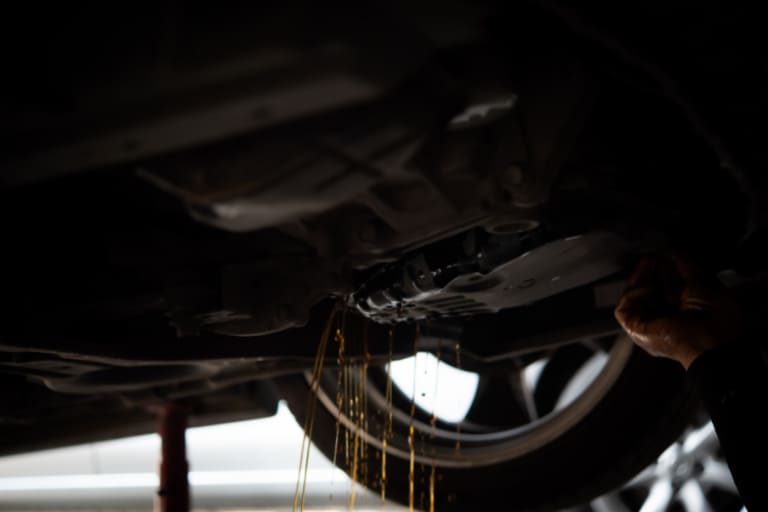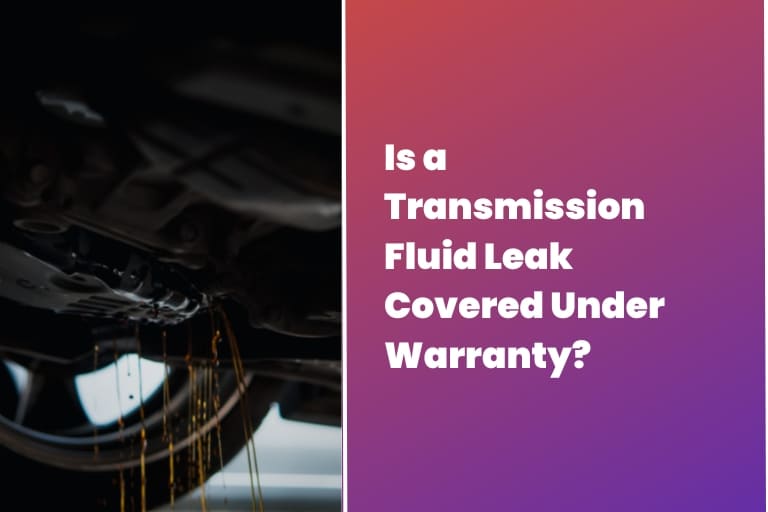One of the most integral parts of keeping an eye on when it comes to car maintenance is the transmission fluid. The transmission transfers engine power to the wheels. If there is insufficient fluid, the transmission may overheat and malfunction.
Transmission fluid leaks are one of the most common causes of transmission failure. If they are not repaired right away, the repairs could be costly.
The main question now is whether the warranty covers a transmission fluid leak. This post will supply you with all the necessary information and offer an answer to your queries.
Transmission fluid leaks can occur in vehicles. This can cause damage to the transmission system if not addressed on time. The cause of a transmission fluid leak can vary, from a manufacturing defect to normal wear and tear.
When there is a leak, verifying whether it is covered by the manufacturer’s or the dealership’s warranty is critical.
Warranty: A warranty is a legal contract that ensures that the manufacturer or dealer will repair or replace any defective parts on a vehicle within a certain period and certain conditions depending on the terms of the warranty.
Whether a transmission fluid leak is covered under warranty depends on the cause and the specific terms of the warranty.
It’s essential to consult the warranty and seek guidance from a dealership or mechanic to determine the cause of the leak and if it’s covered under warranty.
Contents
Is a Transmission Fluid Leak Covered Under Warranty?
The good news is that a vehicle’s powertrain warranty covers transmission fluid leaks. The vehicle’s gearbox, engine, and drivetrain components are usually covered by the manufacturer’s powertrain warranty, which is the most extended and comprehensive guarantee.
To be sure that your warranty covers transmission fluid leaks, it is crucial to review its exact conditions. Some manufacturers may only cover specific leak types or demand that criteria be satisfied after the coverage is granted.
Warranty coverage
Defects in materials or workmanship are usually covered under warranty
This means that if a product is found to be defective within the warranty period, the manufacturer or seller is responsible for repairing or replacing the product at no additional cost to the consumer.
It’s also worth noting that some warranties only cover certain defects or have specific requirements that must be met for the warranty to be valid.
The cause of the leak will determine the coverage
If a defect causes the transmission fluid leak in materials or workmanship, it would typically be covered under warranty.
In this case, the manufacturer or seller would be responsible for repairing or replacing the transmission at no additional cost to the consumer.
Normal wear and tear, neglect, abuse and external causes may not be covered.
However, if the transmission fluid leak is caused by normal wear and tear, an accident, or misuse, it may not be covered under warranty. In such cases, the transmission’s repair or replacement would be the consumer’s responsibility.
NOTE: It is always a good idea to examine your brake pads once a year or if you notice any symptoms. The braking system is not only important for the health of your car, but it also protects you and other road users and is necessary for road safety.
Thus, neglecting this may save you money in the short term but may harm you or other road users in the long run. It is so advised that you should follow the manufacturer’s instructions and keep your car in well maintained condition.”
Warranty terms and guidance
The warranty terms will vary depending on the manufacturer and the specific vehicle, so it is vital to consult the owner’s manual or contact the manufacturer for specific details.
Check the specific terms of the warranty
Warranty terms for fluid leaks typically include coverage for a certain period or mileage and may vary depending on the manufacturer and the specific vehicle. Some common terms include:
- Length of coverage: The warranty period for fluid leaks may be for specific years or miles, such as three years/36,000 miles.
- Type of Coverage: The warranty may cover the cost of repairing or replacing any parts that are found to be the cause of the transmission fluid leakage, such as seals, gaskets, or other transmission components.
- Specific parts covered: The warranty may only cover certain parts of the transmission, such as the oil pan or transmission case.
- Exclusions and limitations: The warranty may not cover leaks caused by external factors, such as damage from accidents, road debris, or leaks caused by improper maintenance or modification of the vehicle.
- Procedures for making a claim: To claim a warranty, you will typically need to bring the vehicle to a dealership or authorized repair facility and provide proof of the fluid leak. The dealer or repair facility will inspect the vehicle and determine if the leak is covered under warranty.
- Reimbursement: If the leak is covered under warranty, the manufacturer will typically cover the cost of the repair or replacement of the affected parts. Some warranties may also cover the cost of towing or rental car expenses.
Guidance from an Expert: A dealership or mechanic

If you suspect a transmission fluid leak, it is crucial to have the vehicle inspected by a dealership or mechanic as soon as possible. They will be able to determine the cause of the leak and if it is covered under your warranty.
A dealership or mechanic will first visually inspect the transmission and surrounding areas for any signs of leakage. They may then perform a road test or use a computer diagnostic tool to check the transmission system, which may help identify the area or component leaking.
If the leak is caused by a manufacturing defect or a problem with a covered component, it should be covered under your warranty. If the leak is determined to be caused by normal wear and tear or damage or neglect on the owner’s part, it may not be covered.
It is essential to keep in mind that not all transmission leaks are covered under warranty, and each manufacturer has different policies and procedures for handling warranty claims. Therefore, it is essential to consult the vehicle’s owner’s manual or contact the manufacturer for specific information on the transmission fluid leak warranty terms and guidance for your particular vehicle.
Also, read:
- How to Change Transmission Fluid Like a Pro
- Transmission Fluid Leak when Parked on An Incline
- Transmission Fluid Leaking From U Joint
- Transmission vs Differential Fluid
- Is a Transmission Fluid Leak Covered Under Warranty
- Can You Add Transmission Fluid While the Car Is Off
- Water in Transmission Fluid: Symptoms & Solutions
- How Long Should I Drive Before Checking the Transmission Fluid
- Transmission Fluid vs Brake Fluid: What’s the Difference
- Choosing the Right Fluid: Transmission Fluid vs Coolant
- How to Flush Transmission Fluid from The Radiator
- Is There a Warning Light for Low Transmission Fluid
- Mistakenly Put Transmission Fluid in The Oil: Is There Any Fix
- Can You Lose Transmission Fluid Without A Leak
Conclusion
An expensive transmission repair may be required due to a fluid leakage, which is a significant problem. However, if the leak were caused by ordinary wear and tear, the powertrain warranty of the car would usually cover it.
To be sure that your warranty covers transmission fluid leaks, it’s crucial to review its particular terms. Some manufacturers may only cover specific leak types or demand that selection criteria be satisfied after the coverage is granted.
Fluid leaks may be avoided by routinely monitoring the transmission fluid level and performing prescribed maintenance. To prevent additional harm, it is essential to get a transmission fluid leak checked out by a professional as soon as possible.
It’s crucial to know that warranty coverage varies depending on the manufacturer and model. Please reference the owner’s manual or contact the manufacturer to validate coverage for fluid leaks.
Frequently Asked Questions
Is a leak of transmission fluid a significant issue?
A transmission leak won’t go away by itself. The car’s functionality will be affected if uncontrolled, and you can need a costly repair. Therefore, even while driving with a leaky gearbox may be safe, it is not recommended, and you shouldn’t stop correcting the issue.
What Does a Transmission Warranty Cover?
The driveshaft, axle shafts, and wheels are all covered by a drivetrain guarantee. This kind of coverage does not protect the engine of your car. A powertrain warranty is concentrated on the components that move your car.
Does the Powertrain Warranty Cover Oil Leaks?
In most cases, oil leaks are covered under the powertrain warranty. However, there are some exceptions, such as Oil leaks that are due to wear and tear, Oil leaks that are a result of aftermarket modifications, and Oil leaks that are caused by an accident or other external force.
